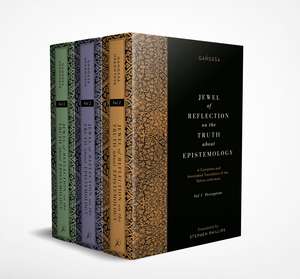Jewel of Reflection on the Truth about Epistemology: A Complete and Annotated Translation of the Tattva-cinta-mani
Autor Gangesa Traducere de Stephen Phillipsen Limba Engleză Quantity pack – 13 mai 2020
Preț: 3544.65 lei
Preț vechi: 4916.75 lei
-28% Nou
Puncte Express: 5317
Preț estimativ în valută:
678.48€ • 737.23$ • 570.29£
678.48€ • 737.23$ • 570.29£
Carte disponibilă
Livrare economică 31 martie-14 aprilie
Preluare comenzi: 021 569.72.76
Specificații
ISBN-13: 9781350066533
ISBN-10: 1350066532
Dimensiuni: 156 x 234 mm
Greutate: 3.46 kg
Editura: Bloomsbury Publishing
Colecția Bloomsbury Academic
Locul publicării:London, United Kingdom
ISBN-10: 1350066532
Dimensiuni: 156 x 234 mm
Greutate: 3.46 kg
Editura: Bloomsbury Publishing
Colecția Bloomsbury Academic
Locul publicării:London, United Kingdom
Caracteristici
Features concise introductions and running commentary that contextualize, analyse and make the text accessible to those unfamiliar with Sanskrit
Notă biografică
Stephen Phillips is Professor of Philosophy and Asian Studies at the University of Texas at Austin, USA, and has been Visiting Professor of Philosophy at the University of Hawaii, Manoa, and at Jadavpur University, Kolkata. He is the author and or co-author of eight books including Yoga, Karma, and Rebirth: A Brief History and Philosophy (2009), Epistemology in Classical India: The Knowledge Sources of the Nyaya School (2012), and (with Matthew Dasti) The Nyaya-sutra: Selections with Early Commentaries (2018).
Cuprins
VOLUME ONE AcknowledgementsBibliographical PrefaceIntroductionAuspicious Performance The Perception ChapterKnowing VeridicalityProduction of Veridical AwarenessDefining Veridical AwarenessPerceptual Presentation of Something as Other Than What It IsDefining PerceptionSensory ConnectionInherenceNon-CognitionAbsenceThe Connection of the Sense Object and LightThe Perceptibility of AirThe Fiery Character of GoldThe Atomicity of the "Internal Organ" (manas)Apperception Indeterminate PerceptionQualifiers versus Indirect IndicatorsDeterminate Perception VOLUME TWO Acknowledgements The Inference ChapterInferential KnowledgeNon-Sharing of a Location (in Defining vyapti, "Pervasion")(Some Further) Prima Facie (Wrong) Views of PervasionThe Right View of PervasionUniversal AbsencePervasion among ParticularsA Quatrad of EntailmentsThe Method of Grasping PervasionHypothetical Reasoning (tarka)The Uniformity of PervasionThe Sensory Relation Characteristic of (Knowledge of) UniversalsThe upadhi, the "Undercutting Condition"What It Is To Be an Inferential SubjectReflection (paramarsa)The Causal Status of the Inferential MarkPositive-only InferenceNegative-only InferenceImplication (arthâpatti)The Components (of a Formal "Inference for Others")The "Pseudo-Prover," hetv-abhasaDeviationThe CommonThe UnexampledThe InconclusiveThe ContradictoryCounterinferenceThe "Unestablished," asiddhiThe "Defeated," badhaShowing Inference FailureInference to isvava (the "Lord")"Power," saktiLocatable PowerCausality"Liberation," mukti The Analogy Chapter VOLUME THREE Acknowledgements The Testimony ChapterDenial of Testimony as a Knowledge SourceMutual ExpectationSemantic FitContiguityIntentionThe Non-Eternality of WordsParts of the Veda as Lost or HiddenInjunctionApurvaReference to the Universal, Part OneReference to the Universal, Part Two ("Indirect Indication," lak?a?a)CompoundsVerbal EndingsVerbal RootsVerbal PrefixesA Quatrad of Knowledge Sources with Knowledge Source Status (Gesture) Appendix A: GlossaryAppendix B: Subtopics by chapter and section (following the delineations of the editors of the Sanskrit editions, N. S. Ramanuja Tatacharya and Gaurinath Sastri)Texts and TranslationsBibliographyIndex
Recenzii
Gangésa's Jewel of Reflection is a classic of world philosophy. It is one of the most important and extensive treatises on epistemology ever composed, and dominates the Indian philosophical scene since its composition in the 14th century. The text addresses every epistemological issue and position then current in India, and does so in great detail. It is impossible to understand the subsequent history of philosophy without studying it. Stephen Philips has produced a masterpiece: a complete translation of the text that is philologically precise, philosophically sensitive, and absolutely lucid and readable by any Anglophone philosopher. If you are an epistemologist or a student of Indian philosophy, there is no excuse not to read.
In this magnificent feat of scholarship, Stephen Phillips brings to a diverse readership a subtle, sophisticated, and technically precise translation of one of the most significant texts of pre-modern Indian philosophy. Sanskritists and historians of Indian ideas, comparative philosophers working with Indian materials, and Western analytic philosophers interested in opening up the cultural sources of technical philosophy , will all find much to learn from this translation. Phillips is right that this work should take its rightful place in global philosophy as a work of great depth and originality; and his translation should ensure that new philosophical projects are influenced by access to it.
This monumental work makes Gangesa's dense and intricate masterpiece accessible to a general philosophical audience. The translation is remarkably readable, and the commentary carefully sets the arguments into the context of the complex interscholastic disputes within the Indian tradition, while explaining them in terms that will be readily comprehensible to analytic philosophers. It has the potential to transform contemporary discussions in epistemology by opening a window into a philosophical tradition that has been too long neglected.
In this magnificent feat of scholarship, Stephen Phillips brings to a diverse readership a subtle, sophisticated, and technically precise translation of one of the most significant texts of pre-modern Indian philosophy. Sanskritists and historians of Indian ideas, comparative philosophers working with Indian materials, and Western analytic philosophers interested in opening up the cultural sources of technical philosophy , will all find much to learn from this translation. Phillips is right that this work should take its rightful place in global philosophy as a work of great depth and originality; and his translation should ensure that new philosophical projects are influenced by access to it.
This monumental work makes Gangesa's dense and intricate masterpiece accessible to a general philosophical audience. The translation is remarkably readable, and the commentary carefully sets the arguments into the context of the complex interscholastic disputes within the Indian tradition, while explaining them in terms that will be readily comprehensible to analytic philosophers. It has the potential to transform contemporary discussions in epistemology by opening a window into a philosophical tradition that has been too long neglected.
